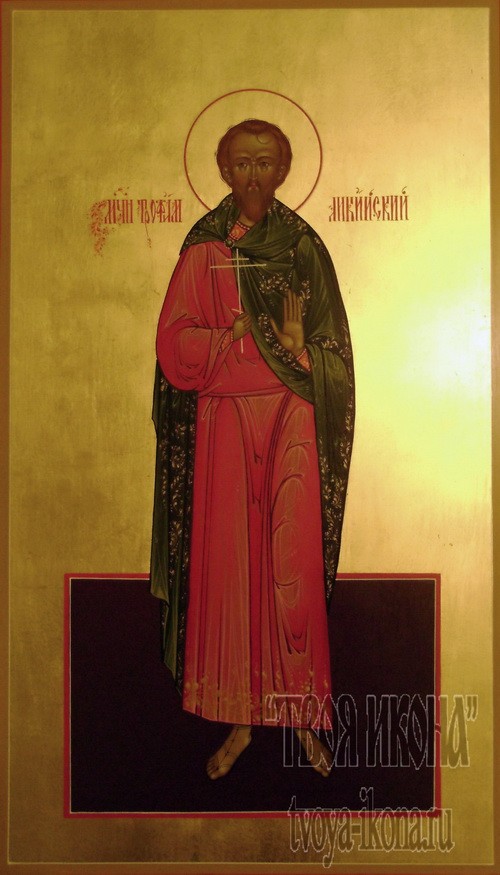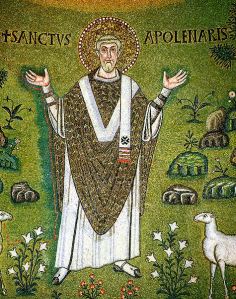|
|
The Holy Martyrs Trophimus and Theophilus and thirteen others with them They suffered in Lycia, in the time of the Emperor Diocletian. Because they would in no way deny Christ nor offer sacrifice to idols, they were put to manifold tortures: they were stoned, flayed with iron flails, their knees were broken and, thus tortured and more dead than alive, they were thrown into the flames, in which the power of God kept them unharmed. They were then taken from the fire and beheaded. The Lord glorified them both on earth and in His heavenly Kingdom. They suffered with honour in Lycia at the beginning of the fourth century. They suffered in Lycia, in the time of the Emperor Diocletian. Because they would in no way deny Christ nor offer sacrifice to idols, they were put to manifold tortures: they were stoned, flayed with iron flails, their knees were broken and, thus tortured and more dead than alive, they were thrown into the flames, in which the power of God kept them unharmed. They were then taken from the fire and beheaded. The Lord glorified them both on earth and in His heavenly Kingdom. They suffered with honour in Lycia at the beginning of the fourth century.The Hieromartyr Apollinarius He was a disciple of the Apostle Peter and was born in the city of Antioch. St Peter took him with him from Antioch to Rome, and, in Rome, consecrated him Bishop of Ravenna. Arriving in Ravenna, Apollinarius went into the house of a soldier, Irenaeus, whose blind son he healed and by this brought the whole family to the Christian faith. He also healed the wife of the military governor of Ravenna of a grave infirmity, and baptised his whole household. At the governor"s request, Apollinarius remained in his house as his guest. Here he formed a house-church, and lived in that house for twelve years, preaching the Gospel and baptising unbelievers. He was grievously tormented in various ways by the pagan elders, but the strong right hand of God upheld him and preserved him. He was finally condemned to exile in Illyria in the Balkans. But the boat in which he was sailing capsized in a storm and, from among all the travellers, only St Apollinarius, together with two soldiers and three of his priests, was saved. Saved so miraculously, the soldiers came to believe in the power of Apollinarius" God and were baptised. Then Apollinarius began preaching the Gospel throughout the Balkans, travelling as far as the Danube. He then went to Thrace, where he spread the Gospel against great opposition. After three years of working in the Balkans, he was driven back to Italy. He went to Ravenna, where the faithful welcomed him with great joy. Hearing of this, the pagan elders wrote to Emperor Vespasian about Apollinarius, calling him a magician and asking if he should be put to death as an opponent of their gods. The Emperor replied that it was not necessary to kill him, but that he should be made to sacrifice to idols or driven from the city, for, he said: "It is not seemly to take revenge on someone on behalf of the gods, for they can themselves be revenged on their enemies if they are angered." But, in spite of this imperial decree, the pagans assaulted Apollinarius and stabbed him with daggers. This servant of God died of his wounds and went to the Kingdom of God. His relics are preserved in Ravenna, in the church dedicated to him. He was a disciple of the Apostle Peter and was born in the city of Antioch. St Peter took him with him from Antioch to Rome, and, in Rome, consecrated him Bishop of Ravenna. Arriving in Ravenna, Apollinarius went into the house of a soldier, Irenaeus, whose blind son he healed and by this brought the whole family to the Christian faith. He also healed the wife of the military governor of Ravenna of a grave infirmity, and baptised his whole household. At the governor"s request, Apollinarius remained in his house as his guest. Here he formed a house-church, and lived in that house for twelve years, preaching the Gospel and baptising unbelievers. He was grievously tormented in various ways by the pagan elders, but the strong right hand of God upheld him and preserved him. He was finally condemned to exile in Illyria in the Balkans. But the boat in which he was sailing capsized in a storm and, from among all the travellers, only St Apollinarius, together with two soldiers and three of his priests, was saved. Saved so miraculously, the soldiers came to believe in the power of Apollinarius" God and were baptised. Then Apollinarius began preaching the Gospel throughout the Balkans, travelling as far as the Danube. He then went to Thrace, where he spread the Gospel against great opposition. After three years of working in the Balkans, he was driven back to Italy. He went to Ravenna, where the faithful welcomed him with great joy. Hearing of this, the pagan elders wrote to Emperor Vespasian about Apollinarius, calling him a magician and asking if he should be put to death as an opponent of their gods. The Emperor replied that it was not necessary to kill him, but that he should be made to sacrifice to idols or driven from the city, for, he said: "It is not seemly to take revenge on someone on behalf of the gods, for they can themselves be revenged on their enemies if they are angered." But, in spite of this imperial decree, the pagans assaulted Apollinarius and stabbed him with daggers. This servant of God died of his wounds and went to the Kingdom of God. His relics are preserved in Ravenna, in the church dedicated to him.Hieromartyr Vitalius, Bishop of RavennaSt. Anna of Leucadia (919)
250 martyrs killed by Bulgarians (802-811)
Eight Martyrs of Carthage
Hieromartyr Apollinaris, bishop of Ravenna (75)The PriestMartyr Apollinarius, Bishop of Ravenna: During the reign of the Roman emperor Claudius (41-54), the holy Apostle Peter came to Rome from Antioch, and he ordained the Antiochene Apollinarius, who had come with him, to be bishop of Ravenna. Arriving in Ravenna as a stranger, Saint Apollinarius asked shelter of a local inhabitant, the soldier Ireneius, and in conversation with him revealed also for what purpose he had come...
|